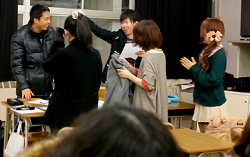Adult Learning and Development
![]() Exploring disparate philosophies and applications of adult education practice can help identify principles for more effectively facilitating perpetual learning that benefits adult learners and society. Emerging research shows that adults have an amazing capacity to learn at all stages of life and that adult education practice provides a broad array of possibilities for enriching individuals' lives while meeting society's needs.
Exploring disparate philosophies and applications of adult education practice can help identify principles for more effectively facilitating perpetual learning that benefits adult learners and society. Emerging research shows that adults have an amazing capacity to learn at all stages of life and that adult education practice provides a broad array of possibilities for enriching individuals' lives while meeting society's needs.
No single approach or theory seems to address the diverse abilities and needs of adult learners adequately, the multiple missions of institutions, and the changing needs of society. Rather than imposing myopic philosophy and ideology, adult educators can be more effective by adapting practice to the dynamically interacting needs of the student and the environment.
- Details
- Written by Brent A Duncan, PhD
Adult education pioneer Malcolm S. Knowles [2] observed that the foundation of the Western education system is built on “the art and science of teaching children.” However, the great teachers of history have been teachers of adults, not children. Aristotle, Confucius, the Buddha, Christ, the Hebrew prophets, and Plato used processes of active inquiry that contrast significantly with the passive reception model that dominates traditional education.
- Details
- Written by Brent A Duncan, PhD
The underlying philosophy of an institution serves as the beacon that guides the decisions of leaders and the actions of members. For example, a belief that the purpose of education is to help individuals realize their potential will likely have a different approach to education than an institution that believes that the purpose of education is to change society.
- Details
- Written by Brent A Duncan, PhD
While each classification of adult education programs may seem mutually exclusive, most perspectives could serve a role in considering options in an adult education program. However, no single philosophy alone seems to be prescriptive. Many philosophies are finding interesting applications in surprising environments. Applications of Marxist Theory in capitalist organizations exemplify an unexpected application. Marxism has traditionally been a philosophy intended to bring down capitalist institutions. However, having proven a practical philosophy for governments to control entire populations, elements of Marxist Theory have emerged in Western capitalist organizations packaged as “Organizational Theory.” Organizational Theory provides organizations with strategies to effectively align the activities of individuals and groups to collectively work to meet organizational objectives, sometimes against the interests of the individual.
- Details
- Written by Brent A Duncan, PhD
Vaill [10, 1, p. 24] saw traditional education as a “system for indoctrination and control” that is insufficient for meeting the needs of individuals, organizations, and society to learn continuously. While the era of lifetime employment upon graduation seems anachronistic, Vaill asserted that lifelong learning is becoming “a way of being…never over or complete.” The more individuals learn, the more they realize what they do not know. These forces drive a shift from traditional education for the masses through institutions toward perpetual learning integrated into all aspects of life to meet the developmental needs of individuals, organizations, and society.




![Your brain can keep growing, adapting, and learning at any age, if you are willing to put in the effort [Image: Copilot]](/images/Images/best-years-for-adult-brain300.png)

